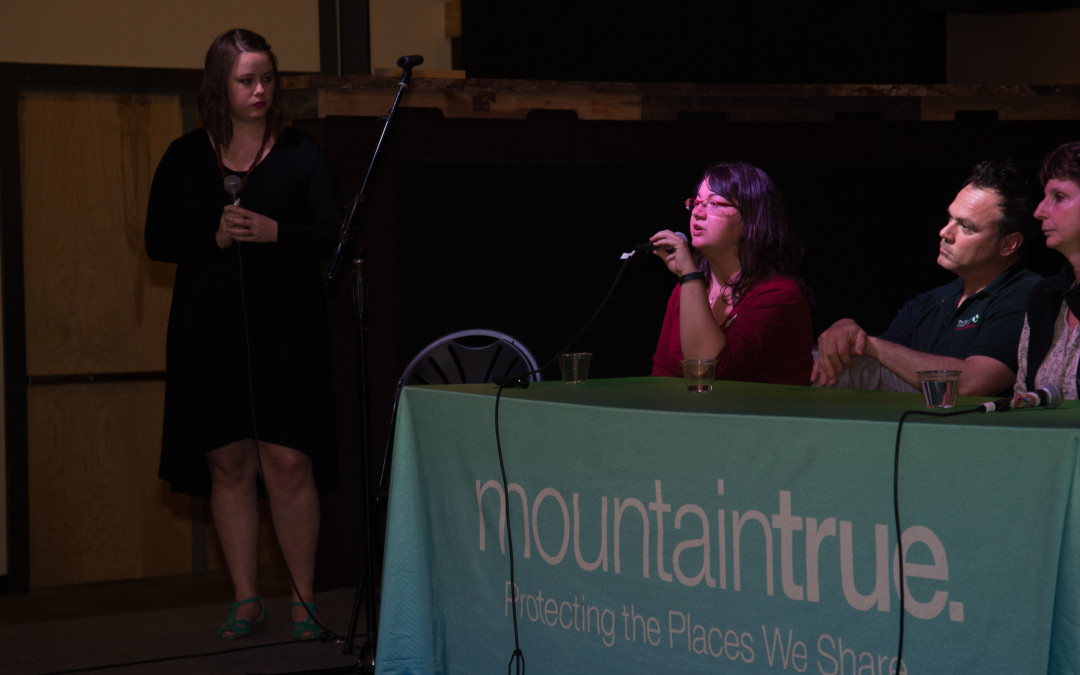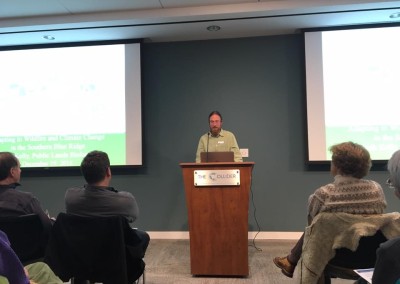We Need To Continue the Civic Conversation on Wildfire, Then Act
Josh Kelly at the Climate Collider
MountainTrue Public Lands Field Biologist Josh Kelly speaking before a full capacity crowd at our “After the Wildfires” event in December at The Collider.
Last year (2016), the Southeast experienced a historic wildfire season that raged across northern Georgia, eastern Tennessee and Western North Carolina. Firefighters from 21 states converged on the region to combat fires that destroyed more than 150,000 acres. In Tennessee, the Chimney Tops 2 fire destroyed sections of the city of Gatlinburg and claimed 14 lives. In North Carolina, the fires forced evacuation, threatened homes and blanketed our region with an acrid haze that was bad for both human health and our local economies.
These fires were faster-moving and more dangerous because of several interrelated trends: climate change is making droughts more severe and frequent and creating drier conditions, lean budgets have prevented forest managers from conducting necessary controlled burns and reducing fuel loads, and our region’s population growth has increased the number of people living in the wildland-urban interface — where homes butt up against dense forest and vegetation.
These are important issues that we cannot afford to ignore. MountainTrue has been working to facilitate a better understanding of wildfire risks. We organized a presentation featuring MountainTrue’s public lands field biologist Josh Kelly and Jim Fox of the National Environmental Modeling and Analysis Center in December of 2016 and a larger panel discussion of experts on April 3, 2017 at Highland Brewing Company in Asheville featuring Dr. Steve Norman and Dr. Katie Greenberg of the US Forest Service, Adam Warwick who is the fire and stewardship manager for The Nature Conservancy’s Southern Blue Ridge Program; and Joan Walker, campaigns director with MountainTrue, who is an expert on community planning. We will continue with wildfire-themed events in Highlands and the High Country.
Raising awareness will not be enough. We need to take action at every level. Homeowners can take the first step by implementing the recommendations of the Firewise Communities Program (firewise.org) which is co-sponsored by USDA Forest Service, the US Department of the Interior, and the National Association of State Foresters, and encourages individuals to take personal responsibility for preparing their home from the risk of wildfire. Similarly, local governments, home builders and communities should implement the standards and best practices set out by the Fire Adapted Communities coalition (fireadapted.org).
Lastly, counties within Western North Carolina historically have had an aversion to zoning and regulation. In the face of rapid population growth, civic leaders should embrace common sense policies regarding construction near steep slopes, and zoning to encourage urban density. Not only would these help combat sprawl and help maintain the attractive vistas that our mountain economies depend upon, they would are also crucial to keeping our communities safe from the growing threat of wildfires.



